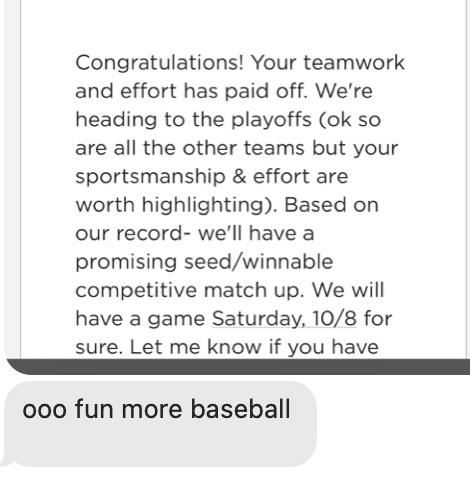
It's actually *good* parenting to skip some games
A chat with about kids' sports with Linda Flanagan
Kids’ sports can sneak up on you. One minute your children are little and you scoff at the notion of becoming one of those parents who somehow lets it happen that they are always taking their kids to practice/meets/games/tournaments. That would never happen to you.
Then maybe a few years later your kid seems to click with a physical/competitive activity. You’re glad they found a thing where all at once they can listen to someone and move around and be with friends and remember rules and experience some light character-building struggles and triumphs and have a place outside the house to go. Also, maybe for a few years, depending on where you lived, your kids couldn’t do these type of activities due to COVID. So what are you going to do, not take your kid to games and practices and stuff? But then all of a sudden that’s the majority of your week. At least that’s my experience.
We are on the precipice of deciding whether kids’ baseball will significantly take over our lives for the next several years, which I don’t want to happen but is there really much choice? And is it normal to be so resentful of something we opted into? It was, thus, fortuitous timing when my friend Edith asked me if I’d want to check out Linda Flanagan’s book, Take Back the Game: How Money and Mania Are Ruining Kids’ Sports. I liked that she comes at the topic from the perspective of a reporter, parent, athlete and coach. I was scribbling “!” types of notes in the margins at the sidelines of my kids’ 9 AM baseball practice as I read it. I ran some of my and some of your questions by her.
Sometimes I just don’t want to go to baseball because honestly, it’s boring and I have other things to do. Other times, I haven’t wanted to go because I was like “I care maybe too much if my kid has a good or bad game” And is that appropriate? To just skip games, basically?
Absolutely. One of the main points I wanted to get across in the book was that kids’ sports are supposed to be for them. It’s not about the parents or the coaches. Even though it has become all about the parents and the coaches and the adults running things, it’s their activity. Baseball is your kids’ activity, and it’s not yours. You’re like a nice little cheerleader and driver. Half the games seems like plenty. I think it can be a real relief to kids too. Mom and Dad aren’t so worried about their performance. It’s better for your children, and it’s better for you.
My younger son, 7, is really obsessed with baseball. Do you have any advice on how to take a middling path if you have a kid who is really into a sport— how to enable his passion and how also not to let it take over our lives? Are there guardrails for that?
I think you have to find the sweet spot between his passion and enthusiasm and him doing as much as he can himself, whether by practicing and signing up and all that stuff. I know he is only seven but as he gets older, the more he’s responsible for it, the better you’ll find that sweet spot between his passion and your whole family, your life as a family unit, because there’s no limit to how much will be asked of you if you just go along with everything, especially in things like baseball.
He could be playing year-round, and that just is not healthy. You have to have some boundaries on what you won’t tolerate. If he wants to go to the travel route, okay, so you join one team, and you don’t play two seasons, and you have just not to let it take over. But at the same time, allow him to pursue it as much as he loves and encourage him to find ways to develop his enthusiasm and interest without it taking over the entire family.
The rule of thumb is that your child shouldn’t be playing a sport more than the number of hours per week than the number of years he is old. Your seven-year-old should not be playing baseball more than seven hours a week. Whether that’s practice or games.
My kids’ coaches have been normal people so far but I get mad when the other team’s coach is a jerk and encourages the kids to be jerks. What’s the general rule for when you should just ignore what you perceive to be a coach who’s being too intense versus when to say something?
If the asshole is coaching a different team and not insulting my own children, I would likely keep quiet about it during the game. If it were really egregious, I’d talk to my own child’s coach later and possibly contact the powers-that-be in the league to notify them of the behavior. I’d also use it as a teaching opportunity with my son or daughter. “I’m sure you noticed how belligerent the opposing coach was. We think it’s inexcusable for adults to talk to kids or officials like that.”
If the asshole coach was in charge of my child’s team, I’d be more proactive. The younger the kid, the greater the need to interfere. Jerky coaches are responsible for turning kids off sports. The Post reported that 70% of kids quit sports by 13. This is so because coaches (and parents) are too serious, too obsessed with results, and thus rob the game of fun. Don’t make a stink about a child’s playing time or position. DO make a stink if the coach uses vile/cruel/demeaning language find the teaching moment here with your kids as well. They will encounter assholes in their lives. Show your offspring a good way to handle them.
And remember that most volunteer coaches are untrained and doing the best they can, which sometimes means falling back on old sports tropes that applaud screaming at kids. If possible, volunteer as an assistant coach to mitigate that behavior—and to speak up tactfully when need be. “I know it’s upsetting when the kids don’t listen, but maybe we should try a different approach. Yelling at them shuts them down.”
I wouldn’t leave that to the kid. There’s plenty of things to leave for the child to do to talk to the coach about. But that’s the kind of thing where I would between innings say, talk to the coach and say, “You need to have a talk with this other coach. This is unacceptable.” I would have no qualms about doing that at all. If you’re noticing it, you can be sure other parents are noticing it too.
You look at the soccer scandal that’s happening right now and now it’s the fact that these girls were just led to believe that being belittled was acceptable and it just isn’t acceptable, and it shouldn’t be at any age.
This is a reader question: “My family is deeply embedded in travel baseball, and it has taken over every weekend. My sons love playing and are both very talented. What is driving me crazy is my husband’s obsession and I don’t think he’s unique. We had one Saturday free from baseball this summer and my husband only brought up topics related to baseball. He also got annoyed with me one day after a 3 game tournament because I didn’t want to go out with the other parents to a bar where they would all sit around breaking down the various plays. It’s like the reverse of the show Dance Moms. So do I just ride this out, or s there some way to ask my husband to take it down a notch without being the family party pooper?”
This reader needs to be the parent who doesn’t care about how well her boys play. Those kids are getting the message from their father that he cares DEEPLY about their performance. I don’t doubt that it’s well-intended on the Dad’s part—he loves to watch them shine!—but it’s not in the boys’ best interest for him to be so obsessed. There will come a time when one or both boys sour on the sport, get injured or start to play poorly. It’s inevitable, even among those who go on to greatness. This turn of events will be that much more painful if the boy feels he’s letting his father down. Even if the dad says nothing, his obvious fixation on the son’s play sends a powerful message. So, Mom, apart from asking your boys if they had fun at the game, encourage other interests and talk about subjects other than baseball. Take them to a museum, or a play, share a great book—anything other than sports.
And to your husband, I might gently encourage a gradual retreat: “I know you love watching the boys play, and I do too, but I think it’s better for them—and for our marriage—if we don’t go to every game or tournament. We want baseball to be their thing, and the more we make it about us, the more pressure they’ll feel. How about we take turns with our friends the Joneses and alternate driving to tournaments? And also, I want them to see that we have a life as a couple, that we’re not just about their sports.” That’s a start, anyway. And share the data from Travis Dorsch at the Families in Sport Lab at Utah State which shows that the more parents spend on their kids’ sports, the less the child enjoys it.
There’s something about sports with families—fathers view it as an expression of their genetics. Mothers, too, but athletics can be so tied up with masculinity that men see their kids, their boys especially, as a little miniature genetic miracle. There’s so much pride in that, and it’s oversized. It’s not in keeping with what’s actually happening. That’s why some of them have to sit elsewhere—it’s so emotional for parents if they’re not self-aware. Maybe the dad here should try my little test. How long does it take you at a cocktail party to tell somebody that your sons play baseball? If it’s within five minutes, you’re probably a little obsessed.
It’s funny because my husband and I are cautious about the toxic masculinity aspect of sports, but also, there’s just this sense of relief in a weird way when your kid takes to a sport, and you’re like, they have an activity, they can get along with people. They have this social mainstream thing. It’s not like, “This is the only way to be,” or I wouldn’t love my kid without it. But there is something that’s like, “Oh, thank goodness. We found a thing that works for them.”
Here’s one place they’re doing okay. They can get along with all the rules and participate, and it makes you feel a sense of relief.
There’s no shame in being proud of your kid for playing sports. It’s nice when they do well. Even though it’s silly, it feels good when they do well, and you should enjoy that as a parent because there’s so much heartache elsewhere.
Here’s another a reader question: “My preschool-aged son is really excited about gymnastics, and I’m totally on board, but I know the gymnastics culture can be so oppressive - and I just have no idea how to look for a place that will be actually focused on fun.”
Avoid any program for very young kids that uses the word “elite” or “competitive.” Your kid does not need to practice high-stakes gymnastics routines. What he needs is movement, fun, being with other kids, and a gentle introduction to the sport. I’d also steer clear of any sports program for young kids that prohibits adults from watching. (Teenagers are a different matter.) It’s not that I’d WANT to watch, by the way. But I’m wary of groups that disallow it.
Are there any sports or certain leagues that are extra balls to the wall competitive or toxic? I think there are a lot of stereotypes around hockey. We all know about baseball and gymnastics. Are there any other leagues you’re cautious about for kids?
I would say that if I had a girl, I would avoid sports that were dependent on judges like gymnastics and figure skating because the emphasis is so greatly on their appearance and getting the favor of others. I think that’s kind of a terrible lesson for girls, in particular, to be judged, to have your performance be based on other people’s judgment of you rather than sports like running and swimming where it’s really meritocratic and the other team sports is more in the middle.
It’s unfathomable what people do for ice hockey. I almost feel like I can’t comment on it because it’s the most expensive sport in terms of dollars and cents and the time commitment is massive and also the injuries that come with ice hockey. You have to get up at 4:00 in the morning because the ice time is from 4:45 to 6 AM and there’s these crazy sacrifices expected of parents more so than in other sports. I can’t imagine ever doing that. But again, there must be something that people love about it.
Here is another reader question that speaks to me because my older son enjoys baseball as well, but I can see him sort of petering out in the next few years. “My son lives and breathes baseball, but I want to manage his expectations, but not crap all over his passion. How do you tell a kid, ‘I believe in you, I’m happy you’re having fun. Also, you probably won’t be a professional player?’”
We want to help you be the best you can be and not hype up a dream that is probably unlikely. Most kids won’t play in college. Most kids certainly won’t play in the pros. Some do, of course, you don’t want to say, “Oh, honey, you’re never going to play in college.” Of course, that’s crapping all over their dreams. If they have that dream. But to encourage them to, “Yes. Keep trying, keep working at it. We’re proud of you. At the same time we’re not going to let baseball take over your life or whatever the sport is. We have to keep some boundaries around our family and not let you be potentially injured by playing too much.” Because the kids that are passionate and the coaches that are telling them they need to play three seasons or four seasons a year and work on your pitching in the fall, are the ones that get hurt.
As a parent, if you can try to protect them from that by not letting it take over but encouraging them that you’re happy about their interest and you hope that they can develop to the best of their ability but meanwhile, saying “Have you thought about playing basketball in the winter or what about the play?” It’s really hard for kids who only think of themselves as this one thing. I think it’s really good to encourage passion the sport but within reason and to also put boundaries around the family and to encourage other activities as well.
As you promote the book, is there anything you wish you’d get asked about more?
I have noticed that very few people ask about what coaches can do better and I’m not sure why that is exactly. I just wish more parents would say, “No. We’re not doing this how about we scale it back? How about we don’t have 10 team dinners this year?” But you’ll see, when you get to high school, that’s what will happen with your kids. If there would just be a little more resistance that you’re not being a bad parent by saying, “Isn’t this a little much?”
I think parents might be worried about overstepping. Or providing feedback when they’re not the ones volunteering. I hate when parents have criticism but no solution.
That’s true because when you are a volunteer coach, it’s like, “Gee, thanks a lot. Here I am just offering my time, you’re giving me shit.” I think that sometimes the coaches are doing what they think the parents want, and the parents would go along because they think it’s what the coach wants. But if you had a talk with the coach who may be a neighbor or friend that said, “It’s fine with us if we don’t have the team get the special backpacks this year. The one from last year works just fine.” And maybe the coach would be like, “Great. I don’t have to organize that.” Then it’s not a criticism. How about we work together? How can I help with that?” Because they don’t deserve criticism. They’re often trying to do what they think parents want.
It really struck me, reading the book, to hear from parents on the other side of their kids’ childhoods who said, “It didn’t matter. In the end, it didn’t matter and we wish we had spent less time on that.” I think a weird subtext of parenting is the knowledge that whatever you’re going through at the moment is incredibly real, yet you know that at some point down the line, your kid would probably be a run-of-the-mill average human and all these things that you care so much about kind of don’t really add up.
I think there’s a Kierkegaard quote that said, "We live life forward but understand it backwards.” It’s so hard to know what’s really important when you’re experiencing it at the moment, like if it’s “Oh my god, he wants to quit or something. Does this mean I’m going to have a kid who doesn’t know resilience, he just quits as soon as the going gets tough.” You just don’t know so with your kids and they’re young, and you don’t know what’s ahead, so it’s so hard to make those decisions and not to view everything is probably more important than it actually is.
I thought that was empowering that you recommend just taking ownership of your schedule and being like, “We’re skipping this game” or “We’re skipping this practice because it’s not the end of the world” instead of “We’re going to skip this wedding because you had one more game.”
Especially since your kids are so young. It’s supposed to be leisure. It’s supposed to be something for your family. As soon as it turns into this oppressive obligation that’s interfering with every other part of life, then that’s a problem. You just have to reclaim it and say no. Some communities conspire to make it seem more important than it is it just isn’t that important. When kids are in elementary and middle school, it’s okay if they miss a game or practice, even if the league views it as unacceptable. I just think you got to reclaim your family and say “Screw it.”
End credits
Thanks for reading Evil Witches, a newsletter for people who happen to be mothers. If you haven’t yet, I hope you consider becoming a paid subscriber which gets you bonus content and helpful/honest/fun members-only threads.
Big fresh welcome to everyone who is a new subscriber in the last few weeks!
If you have any questions, feedback, or suggestions for the newsletter you can reply to this email or talk to other witches on Twitter. FYI, my friend made a Medusa headband that is amazing.
The archives live here. Some random old issues cover how you fit religion or not into your lives, witches who work in theology, and the worst dates to be born.
Are any of you witchy readers out there obstetricians or pediatricians? Please reply to this email if you are—I’m doing some research on cord blood donation.
















A couple of quick notes from a former volunteer coach.
-> Please have your kid to practices/games on time, and text the coach early if the kid will be late or absent. Especially for games, we're making a lineup early, and it's challenging to have to change that 5 minutes before game time. Similarly, please be on time to pick them up at the end of practice/games. We can't leave your kid alone waiting at the field.
-> Please offer to help with practices. The more parents, the more different "stations" we can have going, and the less kids will be standing around waiting their turn. If you can't help with practices, offering to organize other events (end-of-the-season party, game snacks, etc.) will take those tasks off the coaches' plates.
-> Please do not yell at umpires/refs. Like the coaches, they are doing it for the love of the game, not for the piddling $25/game stipend. they do not hate your kid or love the other team. They just don't see everything that happens. As appropriate, your coach can have a talk with the league coordinator. Coaches can be held responsible for parent behavior, and it's never easy (as a coach) to tell a parent to STFU.
-> If you're not happy with the way your kid is being coached, or playing, talk to the coach, but be constructive about it. If your kid needs more than the coach can provide, then it's time to find another team that fits the needs. None of the kids on my team were going to play college or high-level high school softball; if they had that kind of talent, they needed a better coach, and I knew it.
-> THANK THE COACH, and encourage your kids to do so as well. There's a lot of behind-the-scenes work that coaches do...much more to it than just practice and game time. All of it (at least in my case) is in addition to other personal/work responsibilities, and is entirely uncompensated. A little appreciation goes a long way.
(Note: I'm no longer a coach, but that's because my kids aged out and didn't want to play anymore, not out of anger/frustration. For the most part, the parents on my team were great people. Some of the other coaches were not as lucky.)
My kiddo is just turning six so we've not been into the kid's sports from that end, but I've been in martial arts helping with kids coaching for a decade + now and it's so interesting to see the different paths kids take as they get older. Adolescence especially is so hard for kids as their bodies are just all over the place and they have so many competing interests and desires.
A few resources for parents- the US Olympic body has a program called "Safe Sport" that has a module for parents- if there's something about how coaching is going that's making you uncomfortable it's a good module for helping pick out red flags. CDC also has a Heads Up concussion training that any parent whose kid plays a sport with a concussion risk should take.
The best framework I've ever heard for kids sports is "first we teach them how to learn, then we teach them how to train, then we teach them how to compete, then we teach them how to win" And honestly how to win is for, like, high school age. Focusing on winning at age seven when they're still learning how to learn their sport is totally skipping all sorts of steps. And four and five year olds can barely handle learning how to learn, sports at that age are play groups, and that's okay! (Also why my kiddo is not doing sports yet, he can run around on the playground where I don't need to be somewhere on a schedule)